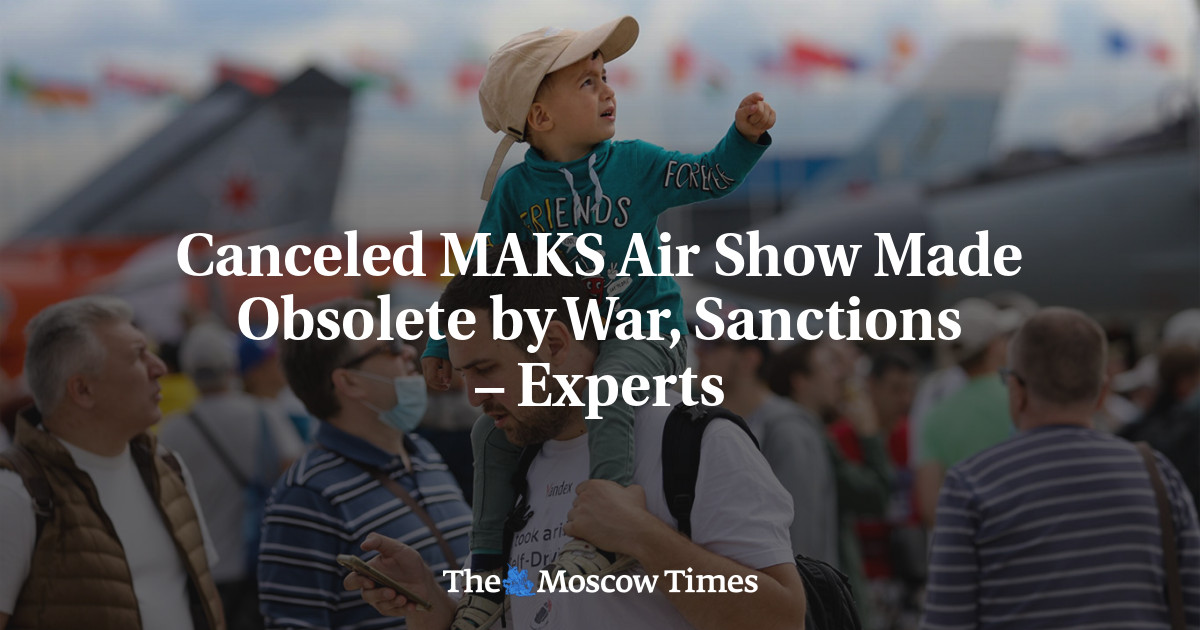
Amid reports this week that Russia has canceled its biggest air show, experts told The Moscow Times that there was little point in holding the International Air and Space Salon (MAKS) because the war in Ukraine and Western sanctions mean there will be so few foreign buyers present.
Western countries imposed stringent sanctions on Russia’s aviation industry shortly after the Kremlin’s decision to send tanks into Ukraine.
MAKS was “put on in order to strengthen ties with foreign partners and now it’s losing its original meaning,” military expert Valery Shiryaev told The Moscow Times.
The apparent cancellation of MAKS, a biennial event that began in 1993 and which usually attracted hundreds of thousands of visitors, makes it yet another major public event in Russia to be scrapped, postponed or scaled down because of the fallout from the Ukraine war.
Hundreds of planes are traditionally put through their paces at MAKS and, at the last event in 2021, companies signed agreements worth 265 billion rubles ($3.31 billion).
While the organizers — defense conglomerate Rostec and Russia’s Industry and Trade Ministry — have yet to confirm MAKS is not taking place, media reports suggested it would not go ahead because of concerns about possible drone attacks as well as a lack of foreign visitors.
In addition, the Russian Air Force’s commitments in the ongoing fighting in Ukraine mean that the offerings at the air show — if it had gone ahead — would have been meager.
“When it comes to military aviation — the battlefield is now a platform for its display,” said aviation expert Roman Gusarov.
“As for the civilian sector — we more or less have nothing to show.”
Even before the cancellation, guests from only five countries — all with close relations with the Kremlin were expected to attend — India, Iran, China, Serbia and Belarus.
In contrast, 20 countries took part in MAKS in 2021.
Another reason to cancel the display is because of heightened security concerns, five aviation industry sources told the Kommersant business daily Wednesday.
In recent weeks, Russia has seen an increase in drone attacks — for which it blames Ukraine — on its territory, including strikes on the Kremlin.
Russia has scrapped a raft of other traditional public events since the invasion of Ukraine because of security concerns, including military parades in honor of the anniversary of the Soviet Union’s defeat of Nazism, school proms and city day celebrations.
“A large number of people, specialists and officials gathered in one place are likely to be [seen as] a tasty morsel,” said Gusarov.
Even beefed-up security would find it difficult to protect an event such as MAKS, according to Gusarov.
“It is likely to be quite difficult to distinguish a MAKS participant flying in the sky from a drone targeting the event,” he told The Moscow Times.
Some locals in the Moscow region town of Zhukovsky, which hosts MAKS, expressed relief that the event had been canceled.
“All such events are, always, potentially extremely dangerous,” said Stanislav, a Zhukovsky resident.
“It’s a really wise decision given the highest level of security threat this year.”
According to Vedomosti, the five-day air show, which had been scheduled to begin on July 25, will be postponed until next summer.
Another local resident, Vladimir Avdeev, who was also pleased at the apparent cancellation, said that the event seemed pointless amid the ongoing Ukraine war.
“The pilots now have another place where they can show their skills,” said Avdeev.
MAKS didn’t reply to a request for comment from The Moscow Times.